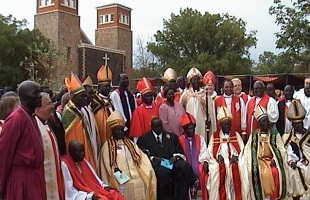Churches hold peace-building dialogue in South Sudan
June 17, 2022 (WAU) – Church leaders in South Sudan held a multi-ethnic peace-building dialogue aimed at uniting and reconciling the population.
The forum, held in Western Bahr el Ghazal state, drew different ethnic groups from Western Equatoria, Lakes, Warrap and Northern Bahr el Ghazal states.
While opening the event, Western Bahr el Ghazal State governor, Sarah Cleto said the dialogue seeks to promote social cohesion and interdependence among ethnic groups in Greater Bahr el Ghazal region.
“I officially launched a 3-day multi-ethnic dialogue workshop in the Episcopal Church of Wau. The dialogue is facilitated by Church Leaders Initiative for Peace (CLIP) and supported by Commission for Justice, Peace, and Reconciliation of the Catholic Church,” she said in a statement.
Rial said the dialogue brings together chiefs, women, and youth leaders from all ethnic groups of Wau, Jur River, Tombura and Nagero counties.
“The resolutions will be implemented by the leaders and 16 participants will be selected to be called Peace Ambassadors”, she stressed.
The country’s only female governor thanked the organizers of the dialogue, and assured participants of her support for its resolutions and action plan.
The Archbishop of Northern Bahr el Ghazal Internal Province of the Episcopal Church of South Sudan, Bishop Moses Deng Bol commended supporters of the initiative, saying multi-ethnic dialogue is an opportunity for community-based trauma awareness as well as response training.
The Church Leaders Initiative for Peace (CLIP) organized the dialogue with support from the United States aid arm’s (USAID) Sheja Salam programme.
Shela Salam is USAID-funded peace-building programme implemented by DT Global in partnership with several national organizations, in 13 counties.
The dialogue, facilitated by Trauma Awareness and Healing Alliance (TAHA) experts, attracted more than 50 chiefs, women and youth leaders.
It was preceded by a three-day Inter communal dialogue among all the communities of Western Bahr el Ghazal as well as representatives from the neighbouring counties of Tambura and Nagero of Western Equatoria state.
Founded in 2017, the CLIP aims at building a national identity that reflects the will and aspirations of all the 64 ethnic communities of South Sudan.
Analysts are, however, keen to underline that religion is a constitutive element of national identity, pointing to the essential growth of nationalism and concomitant antagonisms between neighbouring national groups.
(ST)

